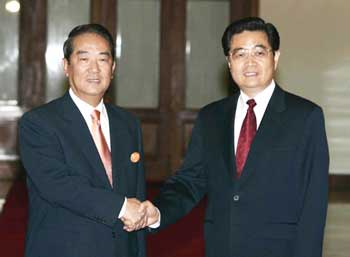
Hu Jintao (right), general secretary of the Communist
Party of China, meets with James Soong, chairman of the People First Party, at
the Great Hall of the People in Beijing yesterday. (Photo:
Xinhua)
Leaders of the Communist Party of China and Taiwan's People First Party
agreed in Beijing yesterday that there will be no military conflicts across the
Taiwan Strait as long as Taiwan does not seek independence, and both pledged to
work together to promote greater trade and economic exchanges.
"Military
conflicts will be effectively avoided as long as there is no possibility that
Taiwan moves toward independence," said a communique issued after a summit
between CPC General Secretary Hu Jintao and PFP Chairman James Soong.
Hu said
"the compatriots on both sides of the strait are all Chinese" and the 23-million
Taiwan residents are "our flesh and blood brothers" who serve as a major force
in developing relations and containing pro-independence activities.
"We'll
take practical measures to promote exchanges and cooperation between the people
on both sides of the strait, remove misunderstanding, develop mutual trust, love
and support each other and build consensus as we work together with one heart
for the great rejuvenation of the Chinese nation," he said.
The agreement
reached during the talks represent a further show of goodwill by the mainland
toward the Taiwan people and reflects the common aspiration for peace, stability
and development of cross-strait relations, Soong said.
The new developments
have built on the fruitful talks between Hu and Chairman Lien Chan of the
Kuomintang Party two weeks ago, authorities said. The CPC and KMT agreed on five
issues including the promotion of a formal end to hostilities, building a mutual
trust military mechanism and allowing Taiwan to participate in activities of the
World Health Organization, some of which were reaffirmed in yesterday's
communique.
The CPC-PFP document said that Taiwan authorities are expected
not to seek independence through "constitutional" changes.
The two parties
also voiced their "firm opposition" to any activities for the "rectification of
Taiwan's name" and "constitutional changes through referendum."
According to
the communique, the two parties will join hands to promote the establishment of
a framework for peace across the strait and a formal end to the state of
hostilities through consultations and negotiations in a bid to reach a peace
accord.
The communique urges the two sides to resume peace talks as soon as
possible and take measures to solve crucial issues on the basis of "mutual
respect and seeking common grounds while reserving differences."
The "1992
Consensus" should be respected and cross-strait peace talks should be conducted
on the basis of the consensus, which highlights the one-China principle and sets
aside discrepancies concerning specific political connotations of "one China,"
the communique said.
The two parties also reached agreements on promoting
overall economic and trade exchanges across the Taiwan Strait on the basis of
mutual benefit:
*The CPC and PFP will promote the realization of two-way
direct flights across the Taiwan Strait by 2006.
*They called for closer
agricultural cooperation and increasing sales of Taiwan farm produce on the
mainland.
*The mainland will exempt customs duties on fruits and other Taiwan
farm products.
*Both parties agreed to work to facilitate customs clearance
of farm goods and their direct transportation.
*Both agreed to promote
two-way, direct investment by enterprises and cooperation in banking, insurance,
securities, transportation and medicine.
*The two parties will promote
cross-strait negotiations on how to avoid double taxation on business
people.
*People-to-people exchanges should be expanded, and procedures on the
mainland should be further simplified for Taiwan residents visiting and leaving
the mainland.
*The mainland should encourage and promote the employment of
Taiwan residents on the mainland.
After the talks, Soong promised that the
PFP will work closely with the KMT to ensure that the Taiwan authorities, headed
by Chen Shui-bian, give serious consideration to the agreements reached in
Beijing.



